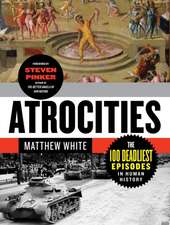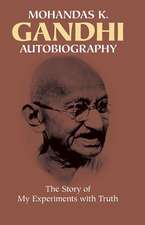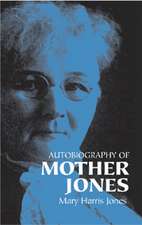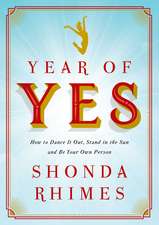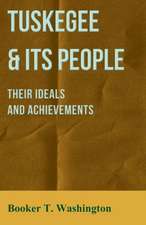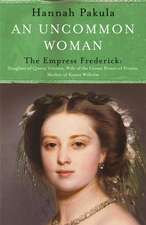Up from Slavery
Autor Booker T Washingtonen Limba Engleză Paperback – 13 mar 2013 – vârsta de la 11 ani
Preț: 27.23 lei
Preț vechi: 32.08 lei
-15% Nou
Puncte Express: 41
Preț estimativ în valută:
5.21€ • 5.43$ • 4.31£
5.21€ • 5.43$ • 4.31£
Carte disponibilă
Livrare economică 13-20 martie
Livrare express 27 februarie-05 martie pentru 20.64 lei
Preluare comenzi: 021 569.72.76
Specificații
ISBN-13: 9780486287386
ISBN-10: 0486287386
Pagini: 160
Dimensiuni: 140 x 210 x 11 mm
Greutate: 0.14 kg
Editura: Dover Publications
ISBN-10: 0486287386
Pagini: 160
Dimensiuni: 140 x 210 x 11 mm
Greutate: 0.14 kg
Editura: Dover Publications
Descriere
Some chroniclers have called black history from 1881 to 1915 'The Age of Booker T. Washington' and the label is apt, for he was without question the most prominent spokesman for his race during the post-Reconstruction period. Many of his contemporaries deemed him a savior -- the one man who could bring concrete improvement to the lives of African-Americans while also promoting racial harmony. Others, particularly black intellectuals, called him a traitor to his race, asserting that his accommodationist position not only contributed to black disenfranchisement and dejure segregation but, in the words of W. E. B. Du Bois, 'practically accepts the alleged inferiority of blacks.' But however one judges Booker T. Washington, his vast influence is inescapable, and his autobiography, "Up From Slavery," winner of the National Book Award, is essential reading for anyone seeking insight into the black experience in the early 20th century. In "Up From Slavery," Washington does not dwell on his relatively brief period of enslavement, focusing instead on his struggle to rise above it. For a more balanced look at the experience of slavery itself, this special Collector's Edition includes excerpts from the slave narratives of five less-well-known black writers, offering perspective and background to Washington's story. The text is further enhanced by a rich mix of archival material from the New York Public Library's Schomburg Center for Research in Black Culture.
Notă biografică
Booker Taliaferro Washington, the educator and racial spokesman who remains one of the most controversial figures in African-American history, was born into slavery on a tobacco farm in Franklin County, Virginia, on April 5, 1856. His mother was the plantation's cook; his father was an unknown white man. At the close of the Civil War, Washington moved with his mother and stepfather to the river town of Malden, West Virginia, where he toiled in coal mines and salt furnaces, securing a basic education in his spare time. Later he worked as a houseboy for Mrs. Viola Ruffner, a New England woman who recognized his eagerness to advance himself. In 1872 Washington returned to Virginia to enroll in the Hampton Normal and Agricultural Institute, a vocational school for blacks founded by Samuel Chapman Armstrong, a former Union general. Washington graduated with honors in 1875. Afterward, he taught school in Malden and briefly attended the Wayland Seminary in Washington, D.C., before accepting an invitation from General Armstrong to join the faculty at Hampton.
In 1881 Washington left Virginia for Alabama, to establish the Tuskegee Normal and Industrial Institute. The school opened on July 4, 1881, with one teacher and thirty pupils. Through skillful management, tireless fund-raising, and shrewd diplomacy with whites, he built Tuskegee, literally brick by brick, into the top black trade school in the country. Like his mentor, General Armstrong, Washington made sure that all skills and academic courses taught at Tuskegee had practical application in the economy of the postwar South. A pragmatist, not an idealist, he endorsed the Puritan virtue of self-help, maintaining, "the individual who can do something that the world wants done will, in the end, make his way regardless of his race."
Washington's well-known success as an educator led to his being asked to speak on racial issues. In 1895 he delivered opening remarks at the Cotton States and International Exposition in Atlanta. In the now-famous Atlanta Compromise Address, Washington urged blacks to postpone their demands for equal rights and focus instead on improving themselves through education, industriousness, and racial solidarity. "In all things that are purely social we can be as separate as the fingers, yet one as the hand in all things essential to mutual progress," he stated. The following year Washington became the first black to receive an honorary Master of Arts degree from Harvard University.
By 1900 Washington, the so-called "Wizard of Tuskegee," had emerged as America's most influential black leader. He launched the National Negro Business League in Boston and, in rapid succession, published two volumes of autobiography: The Story of My Life and Work (1900) and Up from Slavery (1901). William Dean Howells praised Up from Slavery in the North American Review, and Langston Hughes later deemed it "one of America's most revealing books." Washington created a storm of controversy, however, when he dined at the White House with President Theodore Roosevelt to discuss political appointments in the South.
In 1903 Washington's accommodationist position came under attack by W. E. B. Du Bois. In The Souls of Black Folk Du Bois wrote: "His doctrine has tended to make the whites, North and South, shift the burden of the Negro problem to the Negro's shoulders and stand aside as critical and rather pessimistic spectators; when in fact the burden belongs to the nation, and the hands of none of us are clean if we bend not our energies to righting these great wrongs." Soon Washington's leadership was challenged by the militant Niagara Movement, founded in 1905, and the National Association for the Advancement of Colored People, which succeeded it in 1910.
Washington maintained a grueling work schedule during his final years. He also toured Europe and brought out two last books, My Larger Education (1911) and The Man Farthest Down (1912). In November 1915, while visiting New York City on business, Washington was hospitalized. Realizing the gravity of his condition, he insisted on returning home. "I was born in the South, have lived all my life in the South, and expect to die and be buried in the South," he often said. Booker T. Washington arrived in Alabama by train only hours before his death on November 14, 1915. He was buried two days later in the small cemetery on the campus of the Tuskegee Institute.
In 1881 Washington left Virginia for Alabama, to establish the Tuskegee Normal and Industrial Institute. The school opened on July 4, 1881, with one teacher and thirty pupils. Through skillful management, tireless fund-raising, and shrewd diplomacy with whites, he built Tuskegee, literally brick by brick, into the top black trade school in the country. Like his mentor, General Armstrong, Washington made sure that all skills and academic courses taught at Tuskegee had practical application in the economy of the postwar South. A pragmatist, not an idealist, he endorsed the Puritan virtue of self-help, maintaining, "the individual who can do something that the world wants done will, in the end, make his way regardless of his race."
Washington's well-known success as an educator led to his being asked to speak on racial issues. In 1895 he delivered opening remarks at the Cotton States and International Exposition in Atlanta. In the now-famous Atlanta Compromise Address, Washington urged blacks to postpone their demands for equal rights and focus instead on improving themselves through education, industriousness, and racial solidarity. "In all things that are purely social we can be as separate as the fingers, yet one as the hand in all things essential to mutual progress," he stated. The following year Washington became the first black to receive an honorary Master of Arts degree from Harvard University.
By 1900 Washington, the so-called "Wizard of Tuskegee," had emerged as America's most influential black leader. He launched the National Negro Business League in Boston and, in rapid succession, published two volumes of autobiography: The Story of My Life and Work (1900) and Up from Slavery (1901). William Dean Howells praised Up from Slavery in the North American Review, and Langston Hughes later deemed it "one of America's most revealing books." Washington created a storm of controversy, however, when he dined at the White House with President Theodore Roosevelt to discuss political appointments in the South.
In 1903 Washington's accommodationist position came under attack by W. E. B. Du Bois. In The Souls of Black Folk Du Bois wrote: "His doctrine has tended to make the whites, North and South, shift the burden of the Negro problem to the Negro's shoulders and stand aside as critical and rather pessimistic spectators; when in fact the burden belongs to the nation, and the hands of none of us are clean if we bend not our energies to righting these great wrongs." Soon Washington's leadership was challenged by the militant Niagara Movement, founded in 1905, and the National Association for the Advancement of Colored People, which succeeded it in 1910.
Washington maintained a grueling work schedule during his final years. He also toured Europe and brought out two last books, My Larger Education (1911) and The Man Farthest Down (1912). In November 1915, while visiting New York City on business, Washington was hospitalized. Realizing the gravity of his condition, he insisted on returning home. "I was born in the South, have lived all my life in the South, and expect to die and be buried in the South," he often said. Booker T. Washington arrived in Alabama by train only hours before his death on November 14, 1915. He was buried two days later in the small cemetery on the campus of the Tuskegee Institute.
Extras
I was born a slave on a plantation in Franklin County, Virginia. I am not quite sure of the exact place or exact date of my birth, but at any rate I suspect I must have been born somewhere and at some time. As nearly as I have been able to learn, I was born near a cross-roads post-office called Hale's Ford, and the year was 1858 or 1859.* I do not know the month or the day. The earliest impressions I can now recall are of the plantation and the slave quarters—the latter being the part of the plantation where the slaves had their cabins.
*According to Louis H. Harlan's Booker T. Washington: The Making of a Black Leader, 1856-1901, Washington was born in 1856.
My life had its beginning in the midst of the most miserable, desolate, and discouraging surroundings. This was so, however, not because my owners were especially cruel, for they were not, as compared with many others. I was born in a typical log cabin, about fourteen by sixteen feet square. In this cabin I lived with my mother and a brother and sister till after the Civil War, when we were all declared free.
Of my ancestry I know almost nothing. In the slave quarters, and even later, I heard whispered conversations among the coloured people of the tortures which the slaves, including, no doubt, my ancestors on my mother's side, suffered in the middle passage of the slave ship while being conveyed from Africa to America. I have been unsuccessful in securing any information that would throw any accurate light upon the history of my family beyond my mother. She, I remember, had a half-brother and a half-sister. In the days of slavery not very much attention was given to family history and family records—that is, black family records. My mother, I suppose, attracted the attention of a purchaser who was afterward my owner and hers. Her addition to the slave family attracted about as much attention as the purchase of a new horse or cow. Of my father I know even less than of my mother. I do not even know his name. I have heard reports to the effect that he was a white man who lived on one of the near-by plantations. Whoever he was, I never heard of his taking the least interest in me or providing in any way for my rearing. But I do not find especial fault with him. He was simply another unfortunate victim of the institution which the Nation unhappily had engrafted upon it at that time.
The cabin was not only our living-place, but was also used as the kitchen for the plantation. My mother was the plantation cook. The cabin was without glass windows; it had only openings in the side which let in the light, and also the cold, chilly air of winter. There was a door to the cabin—that is, something that was called a door—but the uncertain hinges by which it was hung, and the large cracks in it, to say nothing of the fact that it was too small, made the room a very uncomfortable one. In addition to these openings there was, in the lower right-hand corner of the room, the "cat-hole,"—a contrivance which almost every mansion or cabin in Virginia possessed during the ante-bellum period. The "cat-hole" was a square opening, about seven by eight inches, provided for the purpose of letting the cat pass in and out of the house at will during the night. In the case of our particular cabin I could never understand the necessity for this convenience, since there were at least a half-dozen other places in the cabin that would have accommodated the cats. There was no wooden floor in our cabin, the naked earth being used as a floor. In the centre of the earthen floor there was a large, deep opening covered with boards, which was used as a place in which to store sweet potatoes during the winter. An impression of this potato-hole is very distinctly engraved upon my memory, because I recall that during the process of putting the potatoes in or taking them out I would often come into possession of one or two, which I roasted and thoroughly enjoyed. There was no cooking-stove on our plantation, and all the cooking for the whites and slaves my mother had to do over an open fireplace, mostly in pots and "skillets." While the poorly built cabin caused us to suffer with cold in the winter, the heat from the open fireplace in summer was equally trying.
The early years of my life, which were spent in the little cabin, were not very different from those of thousands of other slaves. My mother, of course, had little time in which to give attention to the training of her children during the day. She snatched a few moments for our care in the early morning before her work began, and at night after the day's work was done. One of my earliest recollections is that of my mother cooking a chicken late at night, and awakening her children for the purpose of feeding them. How or where she got it I do not know. I presume, however, it was procured from our owner's farm. Some people may call this theft. If such a thing were to happen now, I should condemn it as theft myself. But taking place at the time it did, and for the reason that it did, no one could ever make me believe that my mother was guilty of thieving. She was simply a victim of the system of slavery. I cannot remember having slept in a bed until after our family was declared free by the Emancipation Proclamation. Three children—John, my older brother, Amanda, my sister, and myself—had a pallet on the dirt floor, or, to be more correct, we slept in and on a bundle of filthy rags laid upon the dirt floor.
I was asked not long ago to tell something about the sports and pastimes that I engaged in during my youth. Until that question was asked it had never occurred to me that there was no period of my life that was devoted to play. From the time that I can remember anything, almost every day of my life has been occupied in some kind of labour; though I think I would now be a more useful man if I had had time for sports. During the period that I spent in slavery I was not large enough to be of much service, still I was occupied most of the time in cleaning the yards, carrying water to the men in the fields, or going to the mill, to which I used to take the corn, once a week, to be ground. The mill was about three miles from the plantation. This work I always dreaded. The heavy bag of corn would be thrown across the back of the horse, and the corn divided about evenly on each side; but in some way, almost without exception, on these trips, the corn would so shift as to become unbalanced and would fall off the horse, and often I would fall with it. As I was not strong enough to reload the corn upon the horse, I would have to wait, sometimes for many hours, till a chance passer-by came along who would help me out of my trouble. The hours while waiting for some one were usually spent in crying. The time consumed in this way made me late in reaching the mill, and by the time I got my corn ground and reached home it would be far into the night. The road was a lonely one, and often led through dense forests. I was always frightened. The woods were said to be full of soldiers who had deserted from the army, and I had been told that the first thing a deserter did to a Negro boy when he found him alone was to cut off his ears. Besides, when I was late in getting home I knew I would always get a severe scolding or a flogging.
I had no schooling whatever while I was a slave, though I remember on several occasions I went as far as the schoolhouse door with one of my young mistresses to carry her books. The picture of several dozen boys and girls in a schoolroom engaged in study made a deep impression upon me, and I had the feeling that to get into a schoolhouse and study in this way would be about the same as getting into paradise.
So far as I can now recall, the first knowledge that I got of the fact that we were slaves, and that freedom of the slaves was being discussed, was early one morning before day, when I was awakened by my mother kneeling over her children and fervently praying that Lincoln and his armies might be successful, and that one day she and her children might be free. In this connection I have never been able to understand how the slaves throughout the South, completely ignorant as were the masses so far as books or newspapers were concerned, were able to keep themselves so accurately and completely informed about the great National questions that were agitating the country. From the time that Garrison, Lovejoy, and others began to agitate for freedom, the slaves throughout the South kept in close touch with the progress of the movement. Though I was a mere child during the preparation for the Civil War and during the war itself, I now recall the many late-at-night whispered discussions that I heard my mother and the other slaves on the plantation indulge in. These discussions showed that they understood the situation, and that they kept themselves informed of events by what was termed the "grape-vine" telegraph.
During the campaign when Lincoln was first a candidate for the Presidency, the slaves on our far-off plantation, miles from any railroad or large city or daily newspaper, knew what the issues involved were. When war was begun between the North and the South, every slave on our plantation felt and knew that, though other issues were discussed, the primal one was that of slavery. Even the most ignorant members of my race on the remote plantations felt in their hearts, with a certainty that admitted of no doubt, that the freedom of the slaves would be the one great result of the war, if the Northern armies conquered. Every success of the Federal armies and every defeat of the Confederate forces was watched with the keenest and most intense interest. Often the slaves got knowledge of the results of great battles before the white people received it. This news was usually gotten from the coloured man who was sent to the post-office for the mail. In our case the post-office was about three miles from the plantation, and the mail came once or twice a week.The man who was sent to the office would linger about the place long enough to get the drift of the conversation from the group of white people who naturally congregated there, after receiving their mail, to discuss the latest news. The mail-carrier on his way back to our master's house would as naturally retail the news that he had secured among the slaves, and in this way they often heard of important events before the white people at the "big house," as the master's house was called.
I cannot remember a single instance during my childhood or early boyhood when our entire family sat down to the table together, and God's blessing was asked, and the family ate a meal in a civilized manner. On the plantation in Virginia, and even later, meals were gotten by the children very much as dumb animals get theirs. It was a piece of bread here and a scrap of meat there. It was a cup of milk at one time and some potatoes at another. Sometimes a portion of our family would eat out of the skillet or pot, while some one else would eat from a tin plate held on the knees, and often using nothing but the hands with which to hold the food. When I had grown to sufficient size, I was required to go to the "big house" at meal-times to fan the flies from the table by means of a large set of paper fans operated by a pulley. Naturally much of the conversation of the white people turned upon the subject of freedom and the war, and I absorbed a good deal of it. I remember that at one time I saw two of my young mistresses and some lady visitors eating ginger-cakes, in the yard. At that time those cakes seemed to me to be absolutely the most tempting and desirable things that I had ever seen; and I then and there resolved that, if I ever got free, the height of my ambition would be reached if I could get to the point where I could secure and eat ginger-cakes in the way that I saw those ladies doing.
Of course as the war was prolonged the white people, in many cases, often found it difficult to secure food for themselves. I think the slaves felt the deprivation less than the whites, because the usual diet for the slaves was corn bread and pork, and these could be raised on the plantation; but coffee, tea, sugar, and other articles which the whites had been accustomed to use could not be raised on the plantation, and the conditions brought about by the war frequently made it impossible to secure these things. The whites were often in great straits. Parched corn was used for coffee, and a kind of black molasses was used instead of sugar. Many times nothing was used to sweeten the so-called tea and coffee.
From the eBook edition.
*According to Louis H. Harlan's Booker T. Washington: The Making of a Black Leader, 1856-1901, Washington was born in 1856.
My life had its beginning in the midst of the most miserable, desolate, and discouraging surroundings. This was so, however, not because my owners were especially cruel, for they were not, as compared with many others. I was born in a typical log cabin, about fourteen by sixteen feet square. In this cabin I lived with my mother and a brother and sister till after the Civil War, when we were all declared free.
Of my ancestry I know almost nothing. In the slave quarters, and even later, I heard whispered conversations among the coloured people of the tortures which the slaves, including, no doubt, my ancestors on my mother's side, suffered in the middle passage of the slave ship while being conveyed from Africa to America. I have been unsuccessful in securing any information that would throw any accurate light upon the history of my family beyond my mother. She, I remember, had a half-brother and a half-sister. In the days of slavery not very much attention was given to family history and family records—that is, black family records. My mother, I suppose, attracted the attention of a purchaser who was afterward my owner and hers. Her addition to the slave family attracted about as much attention as the purchase of a new horse or cow. Of my father I know even less than of my mother. I do not even know his name. I have heard reports to the effect that he was a white man who lived on one of the near-by plantations. Whoever he was, I never heard of his taking the least interest in me or providing in any way for my rearing. But I do not find especial fault with him. He was simply another unfortunate victim of the institution which the Nation unhappily had engrafted upon it at that time.
The cabin was not only our living-place, but was also used as the kitchen for the plantation. My mother was the plantation cook. The cabin was without glass windows; it had only openings in the side which let in the light, and also the cold, chilly air of winter. There was a door to the cabin—that is, something that was called a door—but the uncertain hinges by which it was hung, and the large cracks in it, to say nothing of the fact that it was too small, made the room a very uncomfortable one. In addition to these openings there was, in the lower right-hand corner of the room, the "cat-hole,"—a contrivance which almost every mansion or cabin in Virginia possessed during the ante-bellum period. The "cat-hole" was a square opening, about seven by eight inches, provided for the purpose of letting the cat pass in and out of the house at will during the night. In the case of our particular cabin I could never understand the necessity for this convenience, since there were at least a half-dozen other places in the cabin that would have accommodated the cats. There was no wooden floor in our cabin, the naked earth being used as a floor. In the centre of the earthen floor there was a large, deep opening covered with boards, which was used as a place in which to store sweet potatoes during the winter. An impression of this potato-hole is very distinctly engraved upon my memory, because I recall that during the process of putting the potatoes in or taking them out I would often come into possession of one or two, which I roasted and thoroughly enjoyed. There was no cooking-stove on our plantation, and all the cooking for the whites and slaves my mother had to do over an open fireplace, mostly in pots and "skillets." While the poorly built cabin caused us to suffer with cold in the winter, the heat from the open fireplace in summer was equally trying.
The early years of my life, which were spent in the little cabin, were not very different from those of thousands of other slaves. My mother, of course, had little time in which to give attention to the training of her children during the day. She snatched a few moments for our care in the early morning before her work began, and at night after the day's work was done. One of my earliest recollections is that of my mother cooking a chicken late at night, and awakening her children for the purpose of feeding them. How or where she got it I do not know. I presume, however, it was procured from our owner's farm. Some people may call this theft. If such a thing were to happen now, I should condemn it as theft myself. But taking place at the time it did, and for the reason that it did, no one could ever make me believe that my mother was guilty of thieving. She was simply a victim of the system of slavery. I cannot remember having slept in a bed until after our family was declared free by the Emancipation Proclamation. Three children—John, my older brother, Amanda, my sister, and myself—had a pallet on the dirt floor, or, to be more correct, we slept in and on a bundle of filthy rags laid upon the dirt floor.
I was asked not long ago to tell something about the sports and pastimes that I engaged in during my youth. Until that question was asked it had never occurred to me that there was no period of my life that was devoted to play. From the time that I can remember anything, almost every day of my life has been occupied in some kind of labour; though I think I would now be a more useful man if I had had time for sports. During the period that I spent in slavery I was not large enough to be of much service, still I was occupied most of the time in cleaning the yards, carrying water to the men in the fields, or going to the mill, to which I used to take the corn, once a week, to be ground. The mill was about three miles from the plantation. This work I always dreaded. The heavy bag of corn would be thrown across the back of the horse, and the corn divided about evenly on each side; but in some way, almost without exception, on these trips, the corn would so shift as to become unbalanced and would fall off the horse, and often I would fall with it. As I was not strong enough to reload the corn upon the horse, I would have to wait, sometimes for many hours, till a chance passer-by came along who would help me out of my trouble. The hours while waiting for some one were usually spent in crying. The time consumed in this way made me late in reaching the mill, and by the time I got my corn ground and reached home it would be far into the night. The road was a lonely one, and often led through dense forests. I was always frightened. The woods were said to be full of soldiers who had deserted from the army, and I had been told that the first thing a deserter did to a Negro boy when he found him alone was to cut off his ears. Besides, when I was late in getting home I knew I would always get a severe scolding or a flogging.
I had no schooling whatever while I was a slave, though I remember on several occasions I went as far as the schoolhouse door with one of my young mistresses to carry her books. The picture of several dozen boys and girls in a schoolroom engaged in study made a deep impression upon me, and I had the feeling that to get into a schoolhouse and study in this way would be about the same as getting into paradise.
So far as I can now recall, the first knowledge that I got of the fact that we were slaves, and that freedom of the slaves was being discussed, was early one morning before day, when I was awakened by my mother kneeling over her children and fervently praying that Lincoln and his armies might be successful, and that one day she and her children might be free. In this connection I have never been able to understand how the slaves throughout the South, completely ignorant as were the masses so far as books or newspapers were concerned, were able to keep themselves so accurately and completely informed about the great National questions that were agitating the country. From the time that Garrison, Lovejoy, and others began to agitate for freedom, the slaves throughout the South kept in close touch with the progress of the movement. Though I was a mere child during the preparation for the Civil War and during the war itself, I now recall the many late-at-night whispered discussions that I heard my mother and the other slaves on the plantation indulge in. These discussions showed that they understood the situation, and that they kept themselves informed of events by what was termed the "grape-vine" telegraph.
During the campaign when Lincoln was first a candidate for the Presidency, the slaves on our far-off plantation, miles from any railroad or large city or daily newspaper, knew what the issues involved were. When war was begun between the North and the South, every slave on our plantation felt and knew that, though other issues were discussed, the primal one was that of slavery. Even the most ignorant members of my race on the remote plantations felt in their hearts, with a certainty that admitted of no doubt, that the freedom of the slaves would be the one great result of the war, if the Northern armies conquered. Every success of the Federal armies and every defeat of the Confederate forces was watched with the keenest and most intense interest. Often the slaves got knowledge of the results of great battles before the white people received it. This news was usually gotten from the coloured man who was sent to the post-office for the mail. In our case the post-office was about three miles from the plantation, and the mail came once or twice a week.The man who was sent to the office would linger about the place long enough to get the drift of the conversation from the group of white people who naturally congregated there, after receiving their mail, to discuss the latest news. The mail-carrier on his way back to our master's house would as naturally retail the news that he had secured among the slaves, and in this way they often heard of important events before the white people at the "big house," as the master's house was called.
I cannot remember a single instance during my childhood or early boyhood when our entire family sat down to the table together, and God's blessing was asked, and the family ate a meal in a civilized manner. On the plantation in Virginia, and even later, meals were gotten by the children very much as dumb animals get theirs. It was a piece of bread here and a scrap of meat there. It was a cup of milk at one time and some potatoes at another. Sometimes a portion of our family would eat out of the skillet or pot, while some one else would eat from a tin plate held on the knees, and often using nothing but the hands with which to hold the food. When I had grown to sufficient size, I was required to go to the "big house" at meal-times to fan the flies from the table by means of a large set of paper fans operated by a pulley. Naturally much of the conversation of the white people turned upon the subject of freedom and the war, and I absorbed a good deal of it. I remember that at one time I saw two of my young mistresses and some lady visitors eating ginger-cakes, in the yard. At that time those cakes seemed to me to be absolutely the most tempting and desirable things that I had ever seen; and I then and there resolved that, if I ever got free, the height of my ambition would be reached if I could get to the point where I could secure and eat ginger-cakes in the way that I saw those ladies doing.
Of course as the war was prolonged the white people, in many cases, often found it difficult to secure food for themselves. I think the slaves felt the deprivation less than the whites, because the usual diet for the slaves was corn bread and pork, and these could be raised on the plantation; but coffee, tea, sugar, and other articles which the whites had been accustomed to use could not be raised on the plantation, and the conditions brought about by the war frequently made it impossible to secure these things. The whites were often in great straits. Parched corn was used for coffee, and a kind of black molasses was used instead of sugar. Many times nothing was used to sweeten the so-called tea and coffee.
From the eBook edition.
Textul de pe ultima copertă
For half a century from its publication in 1902 Up from Slavery was the best-known book written by an African American. The life of ex-slave Booker T. Washington embodied the legendary rise of the American self-made man, and his autobiography gave prominence for the first time to the voice of a group which had to pull itself up from extreme adversity. Washington attributes his success to his belief in many of the virtues celebrated by Benjamin Franklin: selflessness, industry, pragmatism, and optimism. But from behind the mask of the humble, plainspoken schoolmaster come hints that reveal Washington the ambitious and tough-minded analyst of power, who had to balance the demands of blacks with the constraints imposed on him by whites. To read Up from Slavery is to explore the means by which Washington rose to become the most influential and powerful black American of his time. How far he compromised African American rights in order to achieve his aims remains a matter of controversy.
Cuprins
Preface; 1. A slave among slaves; 2. Boyhood days; 3. The struggle for an education; 4. Helping others; 5. The reconstruction; 6. Black race and red race; 7. Early days at Tuskegee; 8. Teaching school in a stable and a hen-house; 9. Anxious days and sleepless nights; 10. A harder task than making bricks without straw; 11. Making their beds before they could lie on them; 12. Raising money; 13. Two thousand miles for a five minute speech; 14. The Atlanta Exposition address; 15. The secret of success in public speaking; 16. Europe; 17. Last words; Index.



